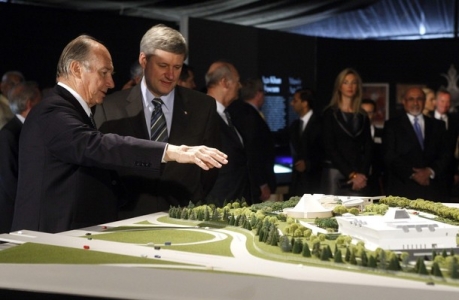Ground broken for Ismaili Muslim landmark - 2010-05-28
Nizar Kassam drove all the way from Chicago to Toronto to witness yet another “groundbreaking moment” of the 70,000-strong Ismaili-Canadian community Friday.
The 66-year-old Tanzanian-born Ismaili businessman was in town for the foundation ceremony of the new Ismaili Centre, the Aga Khan Museum and Islamic park, to be located on a seven–hectare site at Wynford Dr., near Eglinton Ave. E. and Don Mills.
“It’s a privilege for the community to have a home. This is a groundbreaking event not only for the Ismaili community but everyone in Canada,” said Kassam, one of 800 guests at the ceremony held in a gigantic carpeted and air-conditioned white tent set in an empty field.
Aga Khan, PM celebrate Canadian pluralism
“Our spiritual leader, the Aga Khan, preaches peace and pluralism,” he added. “Toronto is a very fitting home for this project.”
Prime Minister Stephen Harper thought so, too, citing the Aga Khan’s famous teaching: “We cannot make the world safe for democracy unless we also make the world safe for diversity.”
“If I may say so, sir, you sound like a Canadian,” said Harper, before presenting the Aga Khan with an honorary Canadian citizenship certificate for his life-long humanitarian and developmental works.
The Aga Khan told the assembled guests those shared values make him feel right at home here.
“You have been part of a distinctive observance — celebrating effort, which is impressive in scale, in aesthetic ambition and in its cultural inspiration — contributing in the best way possible to Canada’s pluralism,” he noted.
Calling the ceremony a “momentous occasion,” community member Saleem Dedhar hopes the museum will allow Canadians to view Islam through a new lens.
“This will showcase who we really are,” said the Toronto engineer, whose family, like many Ismaili Muslims, fled persecution in Africa in the 1970s.
The project is expected to be completed in 2013.
- 8131 reads
 Ismaili.NET - Heritage F.I.E.L.D.
Ismaili.NET - Heritage F.I.E.L.D.